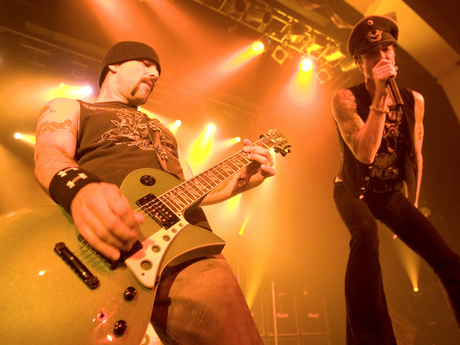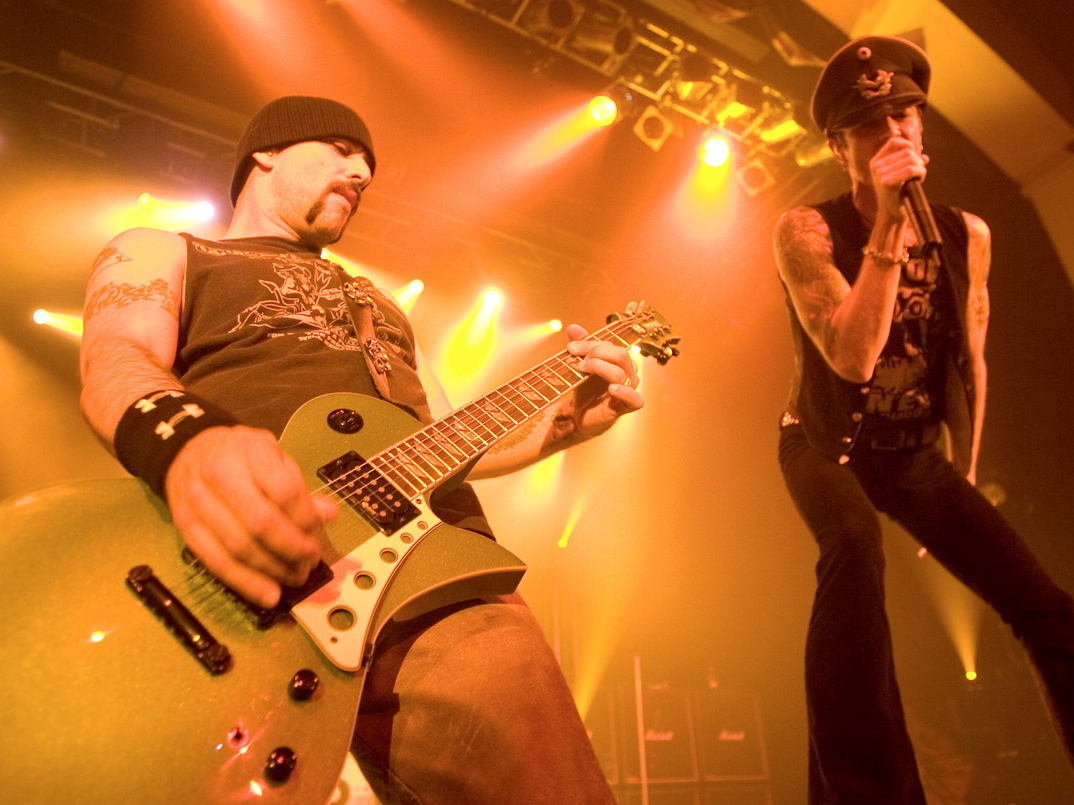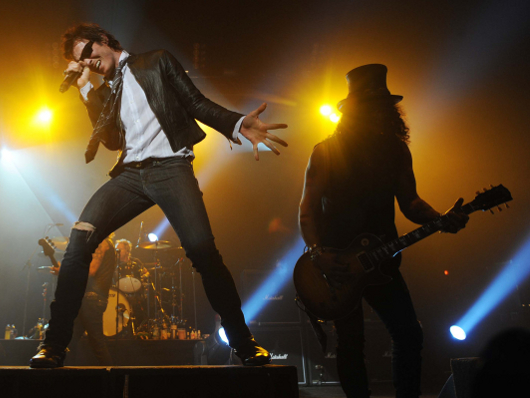Velvet Revolver interview (Monster Riffs Week)
Slash co-conspirator Dave Kushner talks tone, Muse and creating the perfect guitar riff

Want all the hottest music and gear news, reviews, deals, features and more, direct to your inbox? Sign up here.
You are now subscribed
Your newsletter sign-up was successful

© Ethan Miller/Reuters/Corbis
Pipped to the top spot by Muse, Velvet Revolver's 'Slither' takes an honourable second place in the TG reader-voted 50 Greatest Modern Riffs poll. Here Dave Kushner discusses 'Slither''s difficult birth and how to make your riffs stand out in the crowd. Interview: Rob Power
How does it feel to have Slither voted the second best riff of the decade?
"It's great. When I was a kid, and even up until now, I would read guitar magazines to get information on gear and my favourite players, so to be on the other side of that is amazing."
You've beaten off some serious competition from the likes of Metallica, AC/DC, Rage Against the Machine…
"I mean, it's great because half those people Slash and I grew up with, we both grew up in Hollywood. I remember I was in a band and we were playing small clubs with Rage Against the Machine and I was in Infectious Grooves with Robert [Trujillo] who's in Metallica now. It's cool to have been a part of that."
How do you feel about the winner, Muse's 'Plug In Baby'?
Want all the hottest music and gear news, reviews, deals, features and more, direct to your inbox? Sign up here.
"I'll tell you it's a funny story that's almost kind of embarrassing. Muse had been huge in the UK and Europe for a while, but before 'Absolution' [2003] came out in the States they were playing small clubs so I knew them as this small band. When 'Absolution' came out I was really super into the record. We went on tour in Europe and I thought I'd caught on to this small indie band, and every night I'd listen to Muse before I went onstage, like 'Stockholm Syndrome' and the heavier songs on 'Absolution'. I'd do interviews and tell everyone that I was really into this band Muse."

© Rune Hellestad/Corbis
How did you come up with 'Slither'?
"I remember Slash coming in with the riff before Scott [Weiland] was ever in the band. When Scott came in, he picked out different things that he gravitated towards. First, he came in and did 'Set Me Free', that was the first song we ever wrote with him. The next batch of songs were 'Slither', 'Fall To Pieces' and 'Big Machine', so they were the second, third and fourth songs that Scott ever put vocals on.
"I remember 'Slither' as an instrumental and there being so many different versions of it for some reason. The original riff never changed, but the arrangement changed more than any other song I can remember in the band. We laboured a lot over the arrangement, and when we were recording it we laboured a lot over the tempo - at one point Matt kept changing the tempo by 1bpm faster or 2bpm slower to the point where everyone was frustrated with each other and fighting among ourselves because it didn't sound right. It's funny that it came out to be a favourite riff because it was a song that was really an albatross at a certain point. I guess we did something right!"
So who played what during the recording?
"Well, the whole record is me on one side and Slash on the other, the same way 'Appetite For Destruction' was done. At the beginning, Slash is playing the chugging part and I'm playing the octaves and the melody thing. In all the verses we're playing it me on one side and him on the other; in the chorus I'm playing the big chords and he's playing the octave higher. I'm making all the weird noises and delays in the intro as well, and that kind of sweet delay thing that happens in the break. I think those little things make the song really cool beside the riff."
Can you remember what gear you were using on the session?
"I think I used a modified Marshall JCM800 and a Bognor Ecstasy head. As far as guitars go, I'm pretty sure I used a Fernandes Monterey and I know the pedal I used to get that weird sound was a green Line 6 DL4 delay pedal. In the second half of the verses where I'm doubling the riff and there's a heavier weird distortion, that was a Boss Hyper [FZ-2] Fuzz, which is my favourite pedal."
Why do you think people love Slither so much?
"It's obviously a special riff, there's just something about it. It's hard to write an album with 14 singles on it, but sometimes magic happens and it's just right and there's one song that is obviously the first single, and that was 'Slither' on that record. As a writer, you experience certain times where you write something and you're like, 'Wow, there is really something special here'. I think with that song we just knew as soon as we heard it."
How can up and coming players make their riffs stand out form the crowd?
"I think with a riff-heavy band it comes down to simplicity. If you have a great riff, and you know it's a great riff, then you can't confuse the listener by putting too much other stuff around it. You know what I think it is, what makes a great riff? If you can make a song out of a riff, then it's a great riff."
What do you think makes a killer tone for riff writing?
"If you use a case study like Slash, that guy has sold probably 100 million records in his life time and he uses Les Pauls and Marshalls. If you're a kid and you want to start playing guitar, there's a reason that the Les Paul is one of the most popular guitars in the world and Marshall is one of the biggest amp companies. If you look at Slash, he's still using Les Pauls, and he's still using Marshalls, so if I were a kid looking for a great tone, I'd probably start there."
Matt is a freelance journalist who has spent the last decade interviewing musicians for the likes of Total Guitar, Guitarist, Guitar World, MusicRadar, NME.com, DJ Mag and Electronic Sound. In 2020, he launched CreativeMoney.co.uk, which aims to share the ideas that make creative lifestyles more sustainable. He plays guitar, but should not be allowed near your delay pedals.
